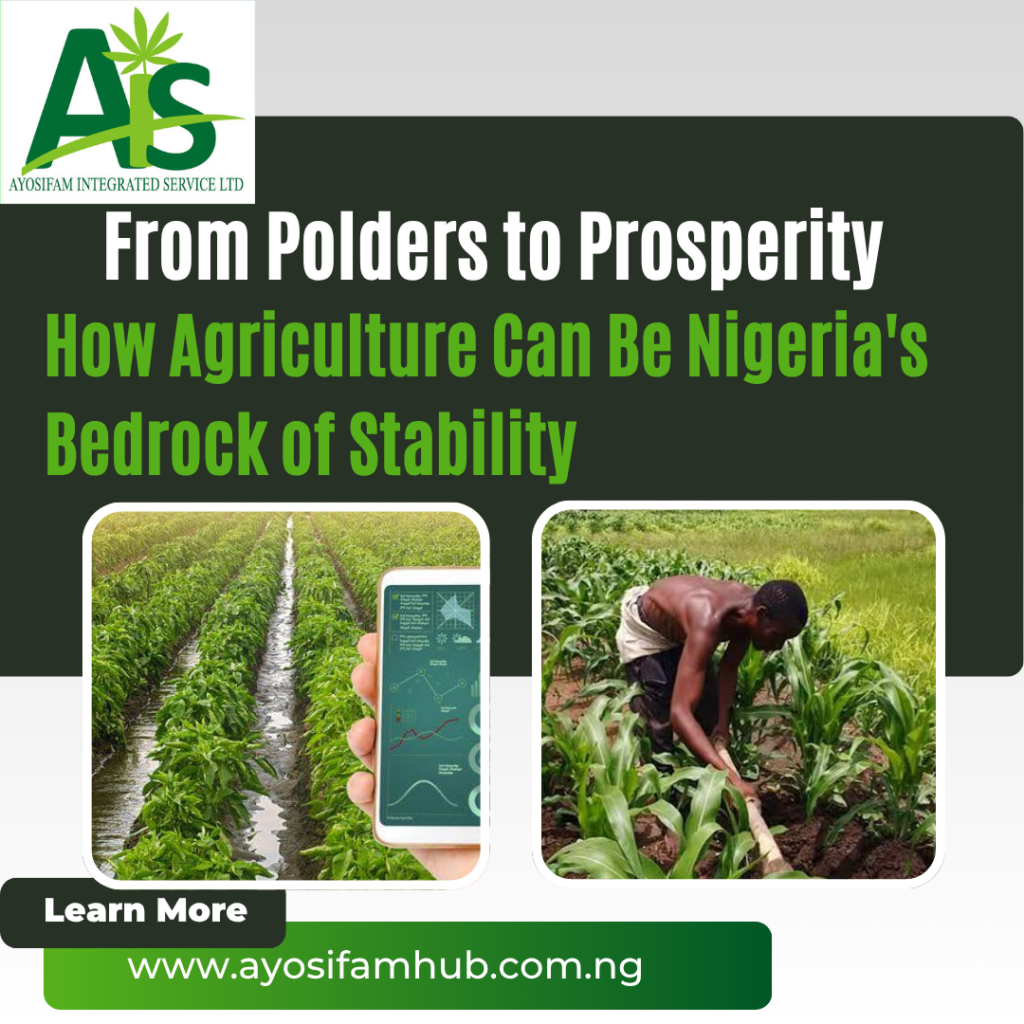
Hey AyosifamHub family!
Today, I want us to take a good look at a country that, despite its small size and challenging geography, has become an agricultural powerhouse: The Netherlands. Often referred to as “God created the world, but the Dutch created the Netherlands,” their story is a powerful testament to how a robust agricultural sector can be the bedrock of national stability, overcoming poverty, hunger, and even insecurity. And then, we’ll draw some parallels to our beloved Nigeria, focusing on two powerhouses of our own: cassava and potato.
The Dutch Miracle: Agriculture as the Architect of Stability
Imagine a country largely below sea level, much of it reclaimed land (polders) protected by intricate dike systems. Sounds like a recipe for constant struggle, right? Yet, the Netherlands is the world’s second-largest exporter of agricultural products by value! How did they achieve this “Dutch Miracle”?
It wasn’t just about growing food; it was about strategic vision, innovation, and unwavering support for their farming sector.
a. Overcoming Poverty: Transforming traditional farming into a high-tech, knowledge-intensive industry, the Dutch created immense wealth. Farmers became highly skilled professionals, earning good incomes, and the ripple effect created jobs in processing, logistics, research, and technology. This widespread economic prosperity significantly reduced poverty, elevating the standard of living for many.
b. Conquering Hunger: With highly efficient production systems, the Netherlands ensures food security for its own population and contributes significantly to global food supply. Their focus on sustainable practices and maximizing yield per square meter means they produce an abundance of high-quality food, making hunger a distant memory.
c. Building Security: A well-fed, economically stable population is inherently more secure. When people have access to food and economic opportunities, the underlying causes of social unrest and insecurity are significantly diminished. A thriving agricultural sector provides employment, reduces competition for scarce resources, and fosters a sense of shared prosperity, all contributing to a more peaceful and stable society.
Their success wasn’t accidental. It was built on:
1. Cutting-edge research and development: Investing heavily in agricultural universities and research institutions.
2. Smart use of technology: From automated greenhouses to precision farming, technology drives efficiency.
3. Strong cooperative models: Farmers working together for common good.
4. Supportive government policies: Creating an enabling environment for growth.
Nigeria’s Green Gold: The Promise of Cassava and Potato
Now, let’s bring it home. Nigeria has a vast agricultural potential, and we don’t need to look to far-flung, exotic crops. We have our own “green gold” that, with the right support, can be transformative: cassava and potato.
These aren’t just staple foods; they are economic powerhouses waiting to be fully unleashed.
A. Cassava: The Versatile Wonder:
a. Food Security Champion: Cassava is a resilient crop, thriving in various Nigerian climates and providing a consistent food source for millions. It’s the ultimate hunger fighter.
b. Poverty Eradicator: Beyond garri and fufu, imagine the potential for cassava derivatives: industrial starch, ethanol, sweeteners, animal feed. Each of these creates a value chain with immense job creation opportunities, from processing plants to transportation and marketing. Smallholder farmers, with access to improved varieties and processing facilities, can move from subsistence farming to commercial ventures, lifting themselves out of poverty.
c. Economic Diversification: A robust cassava industry can significantly diversify our economy away from oil, creating new export opportunities and attracting investment.
B. Potato: The Underground Treasure:
a. Nutritional Powerhouse: Potatoes, especially the sweet potato varieties, are packed with essential vitamins and minerals, offering a vital contribution to our nation’s nutritional needs and combating malnutrition.
b. Job Creation Multiplier: Think beyond just boiled potatoes! Potato chips, crisps, frozen fries, starch, and even potato flour. Each product creates its own industry, generating employment across the entire value chain – from cultivation to processing, packaging, and sales.
c. Regional Development: Potato cultivation is particularly strong in certain regions of Nigeria. With targeted support, these areas can become agricultural hubs, fostering local economies and empowering communities.
What Nigeria Needs to Unleash This Potential: The “AyosifamHub” Approach
Just like the Dutch didn’t achieve their success by chance, Nigeria needs a deliberate, sustained effort. Here’s what we need to see happen for cassava and potato to truly become our bedrock of stability:
1. Investment in Research & Development: We need improved, high-yielding, disease-resistant varieties. Our agricultural research institutes need robust funding and collaboration with international partners.
2. Modern Processing Infrastructure: Moving beyond primary processing is key. We need more factories for industrial starch, ethanol, flour, and snack production for both cassava and potato. This creates higher value and more jobs.
3. Access to Finance and Inputs: Smallholder farmers need easier access to credit, quality seeds/cuttings, fertilizers, and modern farming equipment.
4. Extension Services and Training: Farmers need continuous training on best agricultural practices, post-harvest handling, and market access.
5. Market Linkages: Connecting farmers directly to processors and consumers, reducing post-harvest losses and ensuring fair prices.
6. Enabling Government Policies: Policies that incentivize agricultural investment, protect local industries, and streamline regulations are crucial.
7. Security in Farming Communities: Farmers need to feel safe to cultivate their land. Addressing insecurity in rural areas is paramount.
The AyosifamHub Call to Action:
Let’s advocate for these changes! Let’s celebrate our local farmers and the incredible potential of cassava and potato. Imagine a Nigeria where:
a. Every family has access to nutritious food.
b. Our youth find abundant employment opportunities in the agricultural value chain.
c. Our economy is diversified and resilient, no longer solely reliant on oil.
e. Rural communities thrive, leading to a more secure and stable nation.
The blueprint for success is there, right from the Netherlands’ polders to our own fertile lands. With focused support and a collective vision, cassava and potato can indeed be the anchors that secure Nigeria’s future, overcoming poverty, hunger, and insecurity, and truly becoming the bedrock of our stability.
What are your thoughts on this, AyosifamHub fam? Share your insights in the comments below!



